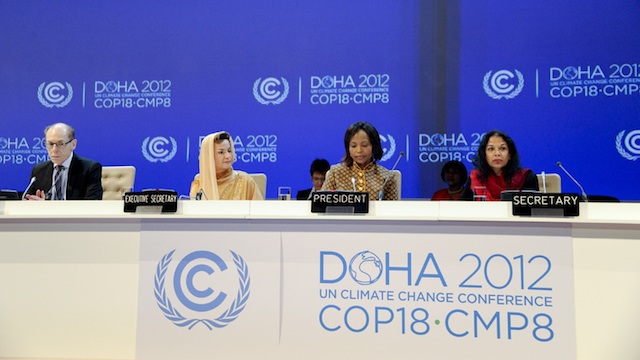SUMMARY
This is AI generated summarization, which may have errors. For context, always refer to the full article.

DOHA, Qatar – UN talks on slowing the pace of destructive global warming ran a whole day into extra time on Saturday, December 8, as negotiators locked horns on details of extending the greenhouse gas-curbing Kyoto Protocol.
A closing plenary called for around 3:00 pm (noon GMT) had not started 3 hours later amid reports of a last-minute deadlock on “hot air” carbon credits.
The talks were originally to have closed on Friday, December 7.
After a long night of haggling, conference chairman Abdullah bin Hamad al-Attiyah urged delegates on Saturday, December 8, to make haste and compromise.
“I sense that although no one is entirely satisfied with the package, there is good general agreement for bringing the agreement to the plenary” for closure, he said.
“I didn’t see any possibility to open the box of Pandora again because we will never finish.”
Delegates must sign off on a new term for the Kyoto Protocol on curbing Earth-warming greenhouse gases as an interim measure to rein in climate change pending a new pact due to take effect in 2020.
But observers said negotiators from Russia and Poland were unhappy with provisions for “hot air” — emission quotas that countries were given under the first leg of the protocol and did not use — some 13 billion tons in total.
The credits can be sold to nations battling to meet their own quotas, meaning that greenhouse gas levels decrease on paper but not in the atmosphere.
Poland and Russia emitted much less than their lenient limits, and insist on being allowed to bank the difference beyond 2012 — a move most other parties vehemently oppose.
The talks also stumbled on funding for poor countries to deal with global warming and convert to planet-friendlier energy sources, with developed nations citing tough financial times.
Developed nations were under pressure in Doha to show how they intend to keep a promise to raise climate funding for poorer nations to $100 billion (76 billion euros) per year by 2020 — up from a total of $30 billion in 2010-2012.
Developing countries say they need at least another $60 billion between now and 2015 — starting with $20 billion from next year — to deal with a climate change-induced rise in droughts, floods, rising sea levels and storms.
But the United States and European Union have refused to put concrete figures on the table for 2013-2020.
Another point of dispute was a demand by least developed countries and those most at risk of sea level rise that provision be made for the losses they suffer because of climate change — a phenomenon they blame on the West’s polluting ways since the industrial era.
NGOs and delegates have expressed frustration at the slow pace of negotiations that coincided with a slew of fresh scientific warnings that the Earth faces a calamitous future of more frequent extreme weather events.
The UN is targeting a maximum temperature rise of two degrees Celsius (3.6 degrees Fahrenheit) on pre-industrial levels that scientists believe would be manageable, but recent evidence warns the planet may be on the path to double that.
The Kyoto Protocol is the world’s only binding pact on curbing greenhouse gases, but locks in only developed nations and excludes major developing polluters such as China and India, as well as the United States, which refused to ratify it.
A new 2020 deal, due to be finalised by 2015, will include commitments for all the world’s nations, and success in Doha is seen as key to smoothing the way to a 2020 pact. – Agence France-Presse
Add a comment
How does this make you feel?
There are no comments yet. Add your comment to start the conversation.